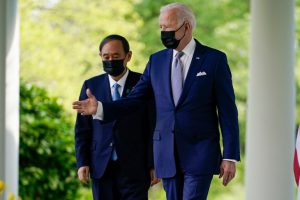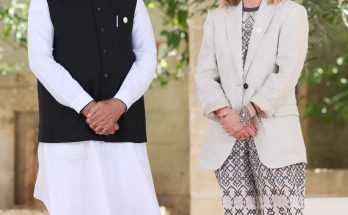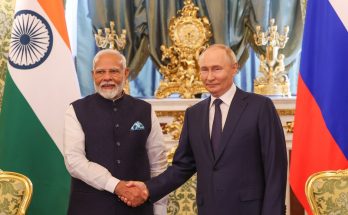By Simran Walia

The first summit meeting between US President Joe Biden and Japanese Prime Minister Yoshihide Suga on April 16 has significant implications for shaping a free, open and thriving Indo-Pacific. The wide-ranging talks between the two leaders in Washington culminated in a joint resolve to bolster the Quad and enhance across-the-board cooperation in Indo-Pacific.
The two leaders focussed on the centrality of the ASEAN in the Indo-Pacific and the importance of the trilateral cooperation with the Republic of Korea for shared security and prosperity. They also pledged to work together in addressing the global threats from Covid-19 and climate change while maintaining the free and open rules-based international order.
Both the nations are quite committed in taking decisive climate action by 2030 through efforts to limit the global temperature increase to 1.4-degree celsius and 2050 greenhouse gas emissions net-zero goals. In light of this, Mr Biden and Mr Suga launched the ‘US-Japan Climate Partnership’ which is aimed at: Paris Agreement implementation and achievement of the 2030 targets/ nationally determined contributions (NDCs); clean energy technology development, deployment, and innovation; and efforts to support decarbonization in other countries, especially in the Indo-Pacific. The US and Japan will strengthen their cooperation to advance health security and respond to the health crisis. In the summit of the Quad in March 2021, the Quad vaccine experts’ group was established to expand safe and effective Covid-19 vaccine manufacturing and procurement. The US-Japan alliance advances a shared vision for the free and open Indo-Pacific.
Containing China’s assertiveness
The two leaders also shared their views on China’s assertiveness in the Indo-Pacific region and China’s activities that are inconsistent with the international rules-based order. During the meeting, Mr Biden told his Japanese guest that Japan enjoyed ‘our iron-clad support’ on security issues and beyond. They expressed their grave concerns regarding Beijing’s growing maritime moves and the growing tension over Taiwan, wherein they pledged to work together to counter China’s behaviour.
The US-Japan security treaty covers the Senkaku islands, which are Japanese-administered islands, and Beijing claims them as Diaoyu islands. The treaty shows how the two countries have the potential to cooperate to counter China’s assertiveness. The US has restated its support for Japan’s defence under the treaty by using its full capabilities which also includes nuclear capabilities. Article 5 of the treaty applies to the Senkaku islands, wherein any unilateral action that seeks to undermine Japan’s administration of the Senkaku islands is opposed.
The leaders also emphasised the importance of peace and stability across the Taiwan Strait and encouraged the peaceful resolution of cross-strait issues. Before this, the first time both nations mentioned Taiwan was in 1969, before Tokyo normalised relations with Beijing. Attention has been focussed on stability in Taiwan and cautioning Tokyo about the need to balance its security concerns with Japan’s deep economic ties with China. They also shared concerns about the human rights situation in Hong Kong and China’s Xinjiang region, where Washington feels that Beijing is perpetrating genocide against Muslim Uighurs. Japan has been criticised for not taking a strict action in alleged human rights abuses due to its fear of harming business interests of Japanese companies in China.
PM Suga has described the US-Japan alliance as the foundation of peace and stability in the region. He said that ‘freedom, democracy, human rights and the rule of law are the universal values that link our alliance’.
The leaders of India and Japan discussed stepping up joint development and testing of the fifth-generation internet and the sixth-generation technologies for the future. Biden said, The United States and Japan must “maintain and sharpen our competitive edge” and ensure that “those technologies are governed by shared democratic norms that we both share – norms set by democracies, not by autocracies’. Both the nations reaffirmed their commitment towards complete denuclearisation of North Korea, urging North Korea to abide by its obligations under UN security council resolutions.
The two leaders have initiated the launch of a ‘new competitiveness and resilience partnership’. This partnership will help in ensuring a sustainable, inclusive, healthy and global economic recovery and will further generate economic growth through democratic principles. The partnership will focus on competitiveness and innovation, Covid-19 response, global and climate change.
The security relationship between the US and Japan shall be steadfast, despite facing various regional and global challenges. Cooperation with like-minded partners is vital to lead a rules-based international order. Mr Biden also supported PM Suga’s efforts to hold the safe Olympic and Paralympic Games this summer. Efforts should be made and policies implemented towards realising a free and open Indo-Pacific.
Author Profile
- India Writes Network (www.indiawrites.org) is an emerging think tank and a media-publishing company focused on international affairs & the India Story. Centre for Global India Insights is the research arm of India Writes Network. To subscribe to India and the World, write to editor@indiawrites.org. A venture of TGII Media Private Limited, a leading media, publishing and consultancy company, IWN has carved a niche for balanced and exhaustive reporting and analysis of international affairs. Eminent personalities, politicians, diplomats, authors, strategy gurus and news-makers have contributed to India Writes Network, as also “India and the World,” a magazine focused on global affairs.
Latest entries
 In ConversationJuly 26, 2024India-Italy defence collaboration can extend to third countries: Anil Wadhwa
In ConversationJuly 26, 2024India-Italy defence collaboration can extend to third countries: Anil Wadhwa In ConversationJuly 23, 2024Italy views India as a key partner in Indo-Pacific: Vani Rao
In ConversationJuly 23, 2024Italy views India as a key partner in Indo-Pacific: Vani Rao DiplomacyJune 29, 2024First BRICS unveils a roadmap for boosting tourism among emerging economies
DiplomacyJune 29, 2024First BRICS unveils a roadmap for boosting tourism among emerging economies India and the WorldJune 11, 2024On Day 1, Jaishankar focuses on resolving standoff with China
India and the WorldJune 11, 2024On Day 1, Jaishankar focuses on resolving standoff with China






